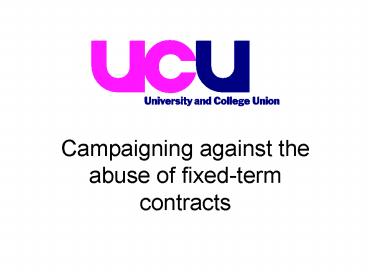Campaigning against the abuse of fixedterm contracts - PowerPoint PPT Presentation
1 / 19
Title:
Campaigning against the abuse of fixedterm contracts
Description:
Fixed Term Employees (Prevention of Less Favourable Treatment) Regulations 2002 ... Commit to no less favourable treatment. Agree limited appropriate uses for ... – PowerPoint PPT presentation
Number of Views:22
Avg rating:3.0/5.0
Title: Campaigning against the abuse of fixedterm contracts
1
- Campaigning against the abuse of fixed-term
contracts
2
Fixed term facts and figures
- The picture across the UK is that the percentage
of fixed-term contracts in use for academic staff
are on the decline. - However, the figures for 2006/7 remain a cause
for concern - All 37.6 (41 in 2005/6)
- TR 11.6 (10 2005/6)
- Research only 77.9 (85 2005/6)
- Teaching only (TS) 53.9 (59 2005/6)
3
Spotlight Leeds
- Comparing the 2004/5 HESA data with the latest
data for 2006/7
4
Fixed term facts and figures
- Although overall numbers are falling slightly, it
is worrying to the UCU that the use of FTCs at
appointment remains alarmingly high. - For academic staff recruited in 2005 over 2/3
were appointed on a FTC - 32 of TR staff
- 72 of teaching only staff
- 96 of research staff
5
Fixed term facts and figures
- The figures for Leeds are even more depressing
- 42.8 of TR staff
- 78.5of teaching only staff
- 96.6of research staff
- were recruited onto FTCs in 2005.
- This implies that the culture of routinely using
FTCs for academics in HE is not changing.
6
How can we change things?
- The legislative framework
- Collective action
- Organising and recruiting
7
Fixed Term Employees (Prevention of Less
Favourable Treatment) Regulations 2002
- Employer cannot treat a fixed-term employee any
less favourably than a comparable permanent
employee unless such treatment can be objectively
justified.
8
Fixed Term Employees (Prevention of Less
Favourable Treatment) Regulations 2002
- If you think you are being treated less
favourably then you should write to the employer
(the UCU can provide model letters) and ask for
their reasons for the treatment. The employer
must respond within 21 days.
9
Fixed Term Employees (Prevention of Less
Favourable Treatment) Regulations 2002
- The use of successive fixed-term contracts will
be limited to four years, unless the continued
use of a fixed-term contract is justified on
objective grounds. Only service from 10 July 2002
counted towards the four-year limit.
10
Fixed Term Employees (Prevention of Less
Favourable Treatment) Regulations 2002
- If you believe that, by virtue of the regulations
you are a permanent employee, you can request in
writing from your employer reasons a statement
that your contract is no longer fixed-term and
that you are now a permanent employee. - Your employer must respond within 21 days of your
request either - Confirming that you are a permanent employee or
- Providing a statement that your contract remains
fixed-term including an explanation of any
objective justification for such an assertion.
11
Collective action - Negotiating a fixed-term
policy
- One way to move the issue forward collectively is
to negotiate a FTC policy with the employer. - This should
- Set out commitments re reducing the use of FTCs
- Commit to improving the security of employment
- Commit to no less favourable treatment
- Agree limited appropriate uses for all FTCs.
- There is a national agreement through JNCHES and
a UCU model for local associations / branches to
refer to.
12
Collective action Using the legislation
- If groups of staff are being treated less
favourably or think they have the right to a
permanent contract think about how you can
support each other in using the legislation. For
example, the local branch could take up the issue
collectively, you could decide a day to all send
in your letters to HR or you could set up a
support network for those willing to take a case.
13
Hourly Paid Staff
- The UCU is also campaigning against the
widespread use of hourly paid contracts. - These tend to
- Be poorly paid
- Be poorly managed
- Offer few career opportunities
- Be for a fixed-term usually not longer than a
year
14
Hourly Paid Staff
- UCU are seeking to
- Ensure hourly paid staff are assimilated to the
new pay and grading structures in a fair way - Ensure equal and fair treatment for hourly paid
staff - Convert hourly-paid to pro-rata contracts
(without loss of income or security) - Recruit and organise hourly paid staff
15
The legislative framework
- FTC regulation
- Part-time worker regulations prohibiting less
favourable treatment - Equal pay
- Equality duties
16
Collective action
- Negotiating for the assimilation of HP staff to
the new pay and grading structures - Using the legislation collectively
17
Collective action campaigning
- Make sure everyone is aware of the issues
- Make sure everyone is aware of their rights
- Make sure the employer knows this is an issue for
the whole union
18
Organising and recruiting
- It is important to use a local campaign on
fixed-term and hourly paid issues to recruit
members to the union and to get FT and HP members
involved in the union.
19
What can I do?
- Join the UCU!
- Recruit new fixed-term / HP members to the UCU
- Improve awareness amongst fixed-term and
hourly-paid colleagues of their rights and
encourage them to use them - Make sure colleagues know that UCU is campaigning
on these issues - Get involved with your LA
- Join the UCU Developing Activists Network (DAN)
- Help your LA with their campaign you can do as
much or as little as you are able































